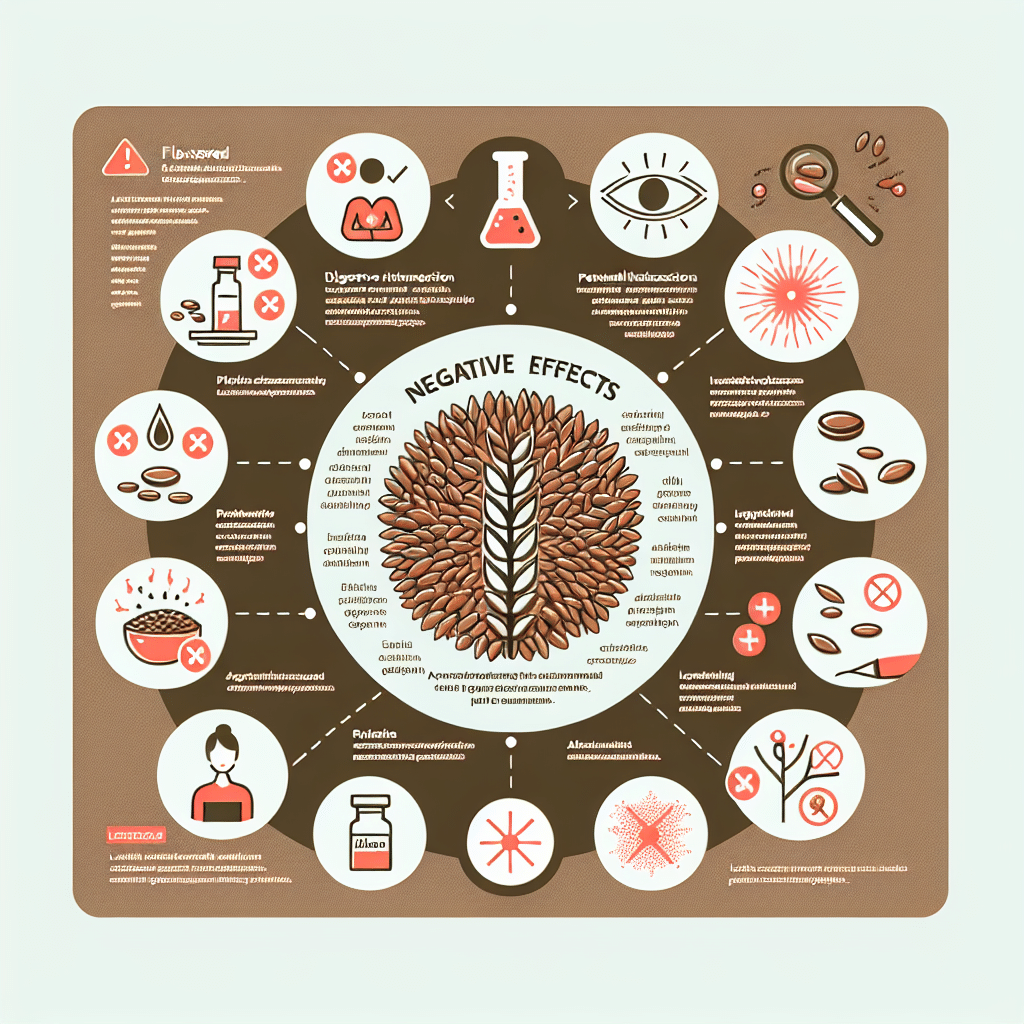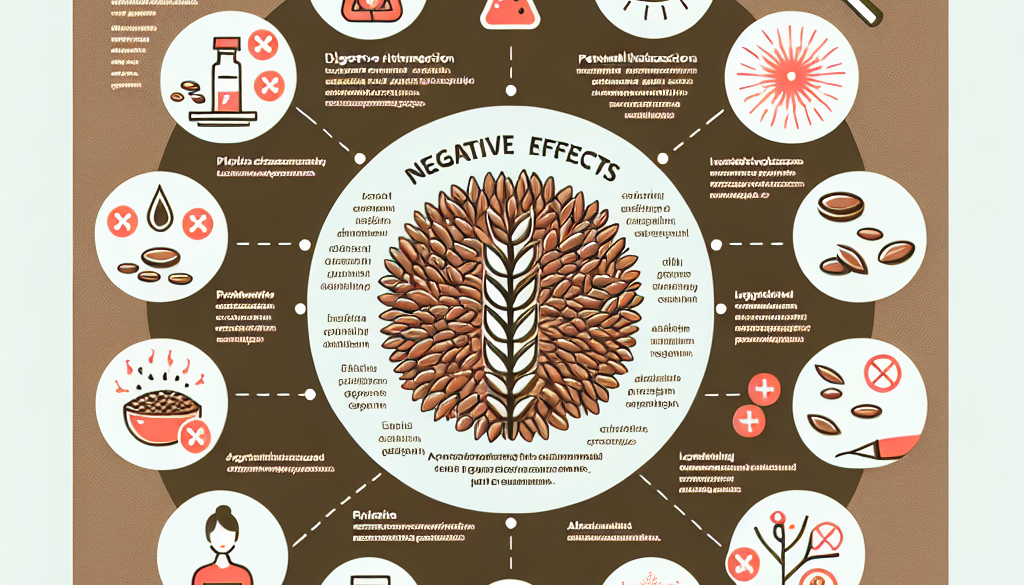Are There Any Negative Effects Of Flaxseed?
-
Table of Contents
- Flaxseed Consumption: Understanding the Potential Negative Effects
- Possible Digestive Discomfort
- Impact on Hormonal Balance
- Interference with Medication Absorption
- Excessive Blood Thinning
- Allergic Reactions
- Cyanide Toxicity Concerns
- Conclusion: Balancing Benefits and Risks
- Discover ETprotein’s High-Quality Protein Products
Flaxseed Consumption: Understanding the Potential Negative Effects

Flaxseed, often hailed as a superfood, is packed with fiber, omega-3 fatty acids, and lignans, which are known for their antioxidant properties. While the health benefits of flaxseed, such as improving digestive health, lowering blood pressure, and reducing the risk of certain cancers, are well-documented, it’s important to consider that even the most healthful foods can have potential downsides. This article explores the negative effects of flaxseed consumption, providing a balanced view for those considering incorporating flaxseed into their diet.
Possible Digestive Discomfort
Flaxseed is rich in dietary fiber, which is beneficial for bowel regularity and overall digestive health. However, a sudden increase in fiber intake can lead to digestive discomfort for some individuals. Symptoms may include:
- Bloating
- Gas
- Abdominal pain
- Constipation or diarrhea
To minimize these effects, it’s recommended to start with a small amount of flaxseed and gradually increase the intake while also ensuring adequate hydration.
Impact on Hormonal Balance
Flaxseeds contain phytoestrogens, particularly lignans, which can mimic the hormone estrogen in the body. While this can be beneficial in certain contexts, such as reducing menopausal symptoms, it may also have negative implications for hormone-sensitive conditions. For example, individuals with hormone-related cancers or those on hormone therapy should consult with a healthcare provider before consuming flaxseed.
Interference with Medication Absorption
The fiber in flaxseed can bind to certain medications, potentially reducing their absorption and effectiveness. This is particularly relevant for medications taken orally, such as:
- Blood thinners
- Diabetes medication
- Hormone replacement therapy
- Cholesterol-lowering drugs
To avoid this interaction, it’s advisable to take medications at least one to two hours before or after consuming flaxseed.
Excessive Blood Thinning
Flaxseed is a good source of omega-3 fatty acids, which have a blood-thinning effect. While this can be beneficial for cardiovascular health, it may pose a risk for individuals with bleeding disorders or those taking blood-thinning medications, as it could increase the risk of bleeding. It’s important to monitor intake and consult with a healthcare provider if you fall into these categories.
Allergic Reactions
Though rare, some individuals may experience allergic reactions to flaxseed. Symptoms can range from mild to severe and include:
- Skin rash
- Hives
- Difficulty breathing
- Anaphylaxis
Anyone with a known allergy to flaxseed should avoid it, and those experiencing symptoms of an allergic reaction should seek immediate medical attention.
Cyanide Toxicity Concerns
Flaxseeds contain cyanogenic glycosides, which can release cyanide when metabolized. While the body can handle small amounts of cyanide, high doses of flaxseed, particularly when consumed in an unprocessed form, could potentially lead to cyanide toxicity. Symptoms of cyanide poisoning include:
- Dizziness
- Nausea
- Headache
- Rapid breathing
However, the risk is generally low when flaxseed is consumed in recommended amounts and prepared properly, such as through cooking or baking.
Conclusion: Balancing Benefits and Risks
While flaxseed offers numerous health benefits, it’s important to be aware of its potential negative effects. Moderation is key, and individuals with specific health conditions or those taking certain medications should consult with healthcare professionals before adding flaxseed to their diet. By understanding the possible downsides and taking appropriate precautions, most people can safely enjoy the advantages of this nutrient-rich seed.
Discover ETprotein’s High-Quality Protein Products
If you’re looking for alternative sources of high-quality protein that cater to various dietary needs, ETprotein offers a range of organic bulk vegan proteins. Their products, including rice protein, pea protein, and seed-based proteins, are non-GMO, allergen-free, and feature a neutral taste, making them an excellent addition to any health-conscious diet.
ETprotein’s offerings are not only beneficial for personal health but also support sustainable and ethical food choices. Whether you’re a manufacturer, trader, or distributor in the food and beverage industry, ETprotein can provide tailored protein solutions to meet your needs.
For those interested in incorporating plant-based proteins into their diet or product line, ETprotein’s expertise and commitment to quality make them a top choice. Contact them today to learn more about their products and how they can enhance your health and business.
About ETprotein:
ETprotein, a reputable protein and L-(+)-Ergothioneine (EGT) Chinese factory manufacturer and supplier, is renowned for producing, stocking, exporting, and delivering the highest quality organic bulk vegan proteins and L-(+)-Ergothioneine. They include Organic rice protein, clear rice protein, pea protein, clear pea protein, watermelon seed protein, pumpkin seed protein, sunflower seed protein, mung bean protein, peanut protein, and L-(+)-Ergothioneine EGT Pharmaceutical grade, L-(+)-Ergothioneine EGT food grade, L-(+)-Ergothioneine EGT cosmetic grade, L-(+)-Ergothioneine EGT reference grade and L-(+)-Ergothioneine EGT standard. Their offerings, characterized by a neutral taste, non-GMO, allergen-free attributes, with L-(+)-Ergothioneine purity over 98%, 99%, cater to a diverse range of industries. They serve nutraceutical, pharmaceutical, cosmeceutical, veterinary, as well as food and beverage finished product distributors, traders, and manufacturers across Europe, USA, Canada, Australia, Thailand, Japan, Korea, Brazil, and Chile, among others.
ETprotein specialization includes exporting and delivering tailor-made protein powder and finished nutritional supplements. Their extensive product range covers sectors like Food and Beverage, Sports Nutrition, Weight Management, Dietary Supplements, Health and Wellness Products, and Infant Formula, ensuring comprehensive solutions to meet all your protein needs.
As a trusted company by leading global food and beverage brands and Fortune 500 companies, ETprotein reinforces China’s reputation in the global arena. For more information or to sample their products, please contact them and email sales(at)ETprotein.com today.












